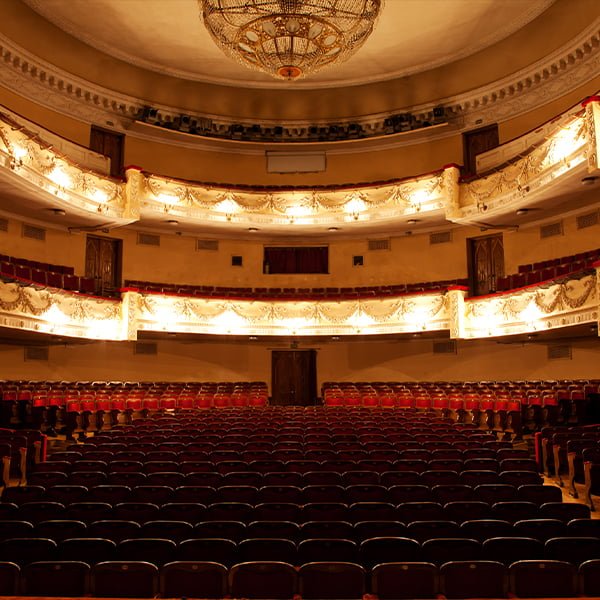Now that you have your tickets and your date is set, that uncomfortable “I’m about to do something new and don’t want to feel out of place” feeling starts to creep in. Don’t get yourself worked up, we’ve got this covered. After all, everyone has to experience the theatre for the first time at some point. While everyone should feel welcome, there are a few traditions you might want to learn about and some advice for being a pro-audience member that will help you relax and enjoy the show.
As a wider variety of productions open on London’s West End, more and more people are discovering the thrill of live theatre. The success of Harry Potter and the Cursed Child has inspired many shows to cater to first-time theatregoers of all ages, with Harry Potter and the Cursed Child shattering attendance records among fans of the books and movies. Star actors like Sheridan Smith in Shirley Valentine, Lily Allen in The Pillowman, and Peter Andre in Grease are attracting a new generation of theatregoers with updated plays. Making theatre more welcoming to people of various backgrounds and interests has been increasingly crucial in recent years, and new initiatives and affordable ticket prices have been introduced to attract wider audiences.
Before You Get to the Theatre
Get there at least 20 or 30 minutes before the show starts. This will give you plenty of time to locate the theatre (if you are not sure of the exact location), enter the building, buy refreshments, retrieve or purchase tickets and use the lavatory if necessary. If your performance is almost or already sold out, you may want to add ten to fifteen minutes to your schedule. Layer up for the cold. You may find the theatre to be too cold in the summer when the air conditioning is on, or too hot in the winter when the heat is on. It’s not possible to find a temperature at which everyone is happy, therefore adjust your expectations accordingly. In terms of attire, there is no standard norm, so you might see people in everything from jeans and t-shirts to tuxedos and ball gowns at the theatre. The theatre provides the perfect setting for a night of bold fashion statements. If you want to fit in with the crowd, it’s best to dress like you would for a pleasant meal out. Audiences prefer to dress even more casually for comedy shows or stand-up. Get your tickets ahead of time. Tickets are usually available at the door for most shows, although this is not always the case and you should book in advance.
When You Get to the Theatre
Pick the correct line. Tickets purchased in advance but not yet picked up can be picked up at the theatres “Will Call” window; patrons will be prompted to provide the name that was used to make the transaction. In case there is a problem with picking up your tickets, it is recommended that you have your order confirmation number on hand. Use the facilities; You won’t want to miss a second of the performance, so plan your visit accordingly. If you’re arriving on a cold night, you should know that the theatre’s coat check will have a line.


Once You’re Seated
Your programme will serve as your map for the performance. Consider it a guide to the events that will unfold. Programmes typically have an introduction from the show’s director, a list of numbers or scenes, bios of the actors, and thanks to the show’s creators, volunteers, donors, sponsors, and local businesses. Don’t miss out on this valuable opportunity to read it when the lights are on.
- Switch off the phone. Notifications and ringtones interrupting a show are among the most annoying things that can happen. You should avoid being “that person.”
- No recording devices, either. Don’t join in if you see others snapping shots around you. Besides, your pictures won’t do the real thing justice. Participate actively and appreciate (not via a screen).
During and After the Show
Relax and take things easy. Take this opportunity to fully appreciate it. In order to ensure that everyone in the audience gets a good view of the stage, it is customary to sink into your seat and enjoy, (with the exception of rare instances, a few live concerts actively encourage standing). If you’re unsure what to do, sit tight. Applause is expected following any musical number or when an act comes to a close or when a performer takes the stage, there are expected to be cheers.
Stay quiet through the performance
The most annoying breach of theatre etiquette is talking loudly or texting during the show. If you’re bringing a young child, it’s best to get there early so you can run over the plot with them. Play a game of silence with them if you dare. We can’t make a peep if the lights are out! It’s wonderful for you if the concert features songs you already enjoy. However, singing along is best saved for the car or the next karaoke night. Remember that other people at the theatre paid money to watch the actors perform, and they might not appreciate it if you started singing along. In the last act of musicals like The Bodyguard and Mamma Mia!, the audience is often invited to sing along. Until then, refrain from singing along, or else you risk being kicked out.
While you’re in the theatre
Don’t critique the show any more than necessary and try to be positive. People in the audience may have invested time and energy into making this performance possible or may have family members or friends performing. However, if you have any questions or issues, any member of staff or volunteer will be more than happy to assist you.
For those visiting the theatre for the first time, it can often be daunting, whether it is a Broadway mainstay, a new West End production, or even a local amateur dramatics show. Take your seat, relax, and enjoy, it may be your first time, but we can guarantee it will not be your last!

















